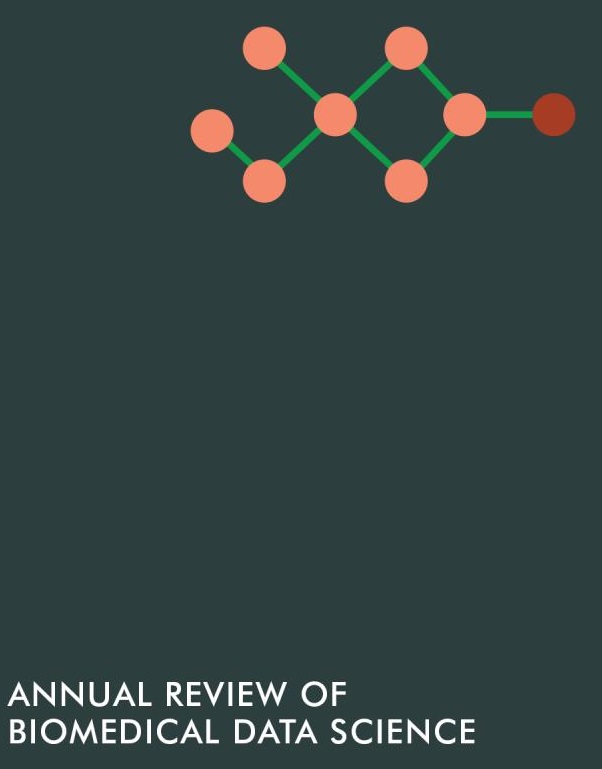Extracellular Vesicle-Based Multianalyte Liquid Biopsy as a Diagnostic for Cancer.
IF 6
Q1 MATHEMATICAL & COMPUTATIONAL BIOLOGY
Annual Review of Biomedical Data Science
Pub Date : 2022-05-13
DOI:10.1146/annurev-biodatasci-122120-113218
引用次数: 5
Abstract
Liquid biopsy is the analysis of materials shed by tumors into circulation, such as circulating tumor cells, nucleic acids, and extracellular vesicles (EVs), for the diagnosis and management of cancer. These assays have rapidly evolved with recent FDA approvals of single biomarkers in patients with advanced metastatic disease. However, they have lacked sensitivity or specificity as a diagnostic in early-stage cancer, primarily due to low concentrations in circulating plasma. EVs, membrane-enclosed nanoscale vesicles shed by tumor and other cells into circulation, are a promising liquid biopsy analyte owing to their protein and nucleic acid cargoes carried from their mother cells, their surface proteins specific to their cells of origin, and their higher concentrations over other noninvasive biomarkers across disease stages. Recently, the combination of EVs with non-EV biomarkers has driven improvements in sensitivity and accuracy; this has been fueled by the use of machine learning (ML) to algorithmically identify and combine multiple biomarkers into a composite biomarker for clinical prediction. This review presents an analysis of EV isolation methods, surveys approaches for and issues with using ML in multianalyte EV datasets, and describes best practices for bringing multianalyte liquid biopsy to clinical implementation. Expected final online publication date for the Annual Review of Biomedical Data Science, Volume 5 is August 2022. Please see http://www.annualreviews.org/page/journal/pubdates for revised estimates.基于细胞外囊泡的多分析物液体活检诊断癌症。
液体活检是分析肿瘤进入循环的物质,如循环肿瘤细胞、核酸和细胞外囊泡(EVs),用于癌症的诊断和管理。随着美国食品药品监督管理局最近批准晚期转移性疾病患者使用单一生物标志物,这些检测方法迅速发展。然而,它们作为早期癌症的诊断缺乏敏感性或特异性,主要是由于循环血浆中的低浓度。EVs是一种由肿瘤和其他细胞脱落到循环中的膜包裹的纳米级囊泡,是一种很有前途的液体活检分析物,因为它们的蛋白质和核酸货物是从其母细胞携带的,它们的表面蛋白是其来源细胞特异性的,并且在整个疾病阶段的浓度高于其他非侵入性生物标志物。最近,电动汽车与非电动汽车生物标志物的结合推动了灵敏度和准确性的提高;这是由使用机器学习(ML)以算法识别多种生物标志物并将其组合成用于临床预测的复合生物标志物所推动的。这篇综述分析了EV分离方法,调查了在多分析细胞EV数据集中使用ML的方法和问题,并描述了将多分析细胞液体活检应用于临床的最佳实践。《生物医学数据科学年度评论》第5卷预计最终在线出版日期为2022年8月。请参阅http://www.annualreviews.org/page/journal/pubdates用于修订估算。
本文章由计算机程序翻译,如有差异,请以英文原文为准。
求助全文
约1分钟内获得全文
求助全文
来源期刊
CiteScore
11.10
自引率
1.70%
发文量
0
期刊介绍:
The Annual Review of Biomedical Data Science provides comprehensive expert reviews in biomedical data science, focusing on advanced methods to store, retrieve, analyze, and organize biomedical data and knowledge. The scope of the journal encompasses informatics, computational, artificial intelligence (AI), and statistical approaches to biomedical data, including the sub-fields of bioinformatics, computational biology, biomedical informatics, clinical and clinical research informatics, biostatistics, and imaging informatics. The mission of the journal is to identify both emerging and established areas of biomedical data science, and the leaders in these fields.

 求助内容:
求助内容: 应助结果提醒方式:
应助结果提醒方式:


